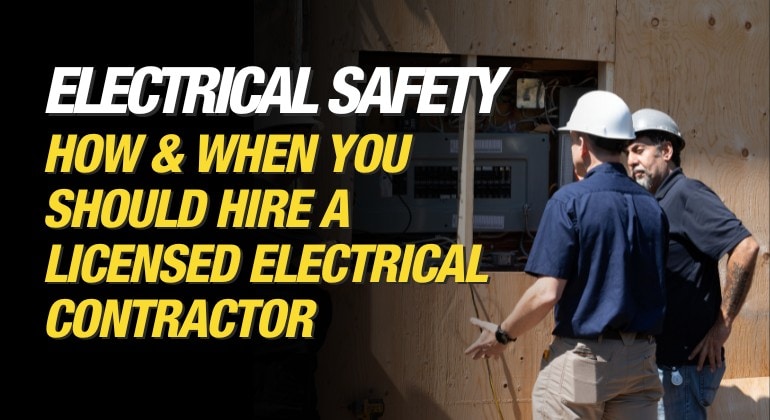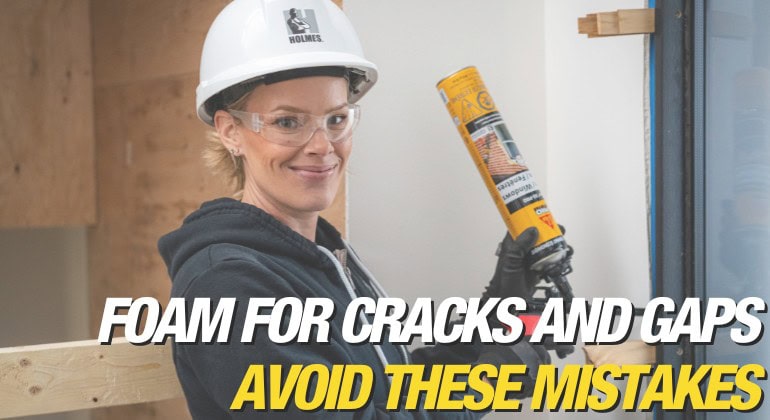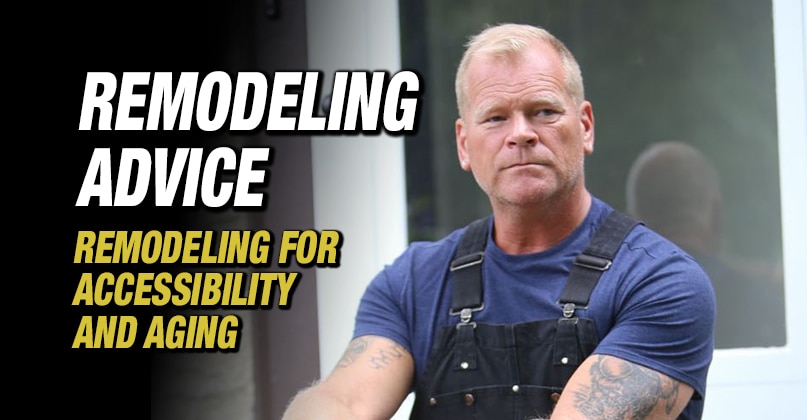Mike Holmes’ #1 Renovation Tip A podcast episode not to be missed! If you have ever wondered “what renovation tips can Mike give me”, this is a podcast episode for...

Hiring a Licensed Electrical Contractor in Ontario: When And How
By Mike Holmes
Mike’s Advice / Electrical
Wednesday, September 13th, 2023 @ 3:43pm
Common Electrical Jobs Every Homeowner Should Know and Who You Should Hire
A well-maintained home is a full-time job; there is always something to be done. Fixing things, painting things, and doing weekend projects. However, many homeowners, particularly those who have older homes, will experience electrical issues that need to be addressed. On MOST of our jobs, there is something wrong with the electrical work. It’s important to understand that 99% of the time, addressing these electrical problems requires hiring a licensed electrical contractor, especially if you live in Ontario.
Let’s break down some of the most common electrical issues that homeowners experience, which should always be fixed and completed by a licensed electrical contractor.
Switch An Outlet Repair Or Install
An overload, damaged wire, or improper connection can all cause a buzzing sound, the breaker to trip or the outlet to stop working. Fixing a switch or outlet or installing a new one requires expert knowledge of wiring along with professional tools and techniques.

Every receptacle installed in kitchens must be GFCI-protected. Kitchen renovation from Holmes Family Rescue Season 1.
RELATED:
Electrical Fire Safety Tips – How To Prevent Electrical Fires At Home
Electrical Panel Upgrades
If your old service panel is rated at under 100 amps, it needs to be upgraded. Most homes will need an upgrade to a 100-amp or 200-amp panel, depending on the size of your home and how much electricity it uses.
You may also notice frequent tripping of breakers, buzzing sounds from the panel, or one that’s hot to the touch. These are never good signs.
READ MORE:
Lighting Repairs And Installations
Lighting issues including flickering, fading, or buzzing are among the most common signs that something is wrong with your electrical. While it could just be a loose bulb, these signs could also indicate obsolete, overloaded, or defective wiring. The circuit could also have too many gadgets or electronics hooked in, or the switch may need to be replaced.
Indoor lighting, outdoor or security lighting, and pool lighting are all examples of electrical services that will require a licensed electrical contractor. Also, pool lighting can get complicated as it may require transformers, a trench for underground wires, including devices that are rated for outdoor use.
RELATED:
How to Choose The Best Smart Lighting For Your Home
Outdoor Lighting Guide: Best Exterior Lighting Tips
Everything You Need to Know Before Installing A Pool Or Hot Tub
Ceiling Fan Installation
Installing a ceiling fan requires expert knowledge of electricity and wiring, specialized equipment, and the right supplies. Attempting this job by yourself is dangerous for you and your family, and you may also end up unnecessarily damaging your home in the process. Mistakes can happen, like using incorrect wiring and connections, which can result in shock or even an electrical fire.
Not to mention, most ceilings are at least 8 feet high, but often vaulted ceilings are higher – anywhere from 12 to 25 feet high. Imagine the maneuvering of the fan and wires, all while securing it properly to the ceiling.
Even if you are replacing the fixture, you still need to know what you are doing, and if it’s a new fixture, you will need to cut a hole in the ceiling. Don’t take the risk. Hire an experienced licensed electrical contractor to do the job.
RELATED:
General Wiring And Rewiring
The problem with electrical wiring is that it won’t last forever, and the older it gets, the more likely there will be issues. Electrical wires eventually degrade, become brittle and break down, and since you can’t see them because they are behind the walls of your home, you might only notice a problem once it is too late.
Because you can’t physically see the wires in your home, you need to recognize the signs that something may be wrong. Remember that the modern home has to support dozens of electronic devices, including smart devices, phones, tablets, and laptops, not to mention all the other new technologies that require more electrical power, like electric vehicles and EV chargers.
A licensed electrical contractor can do an assessment of your electrical system and discuss your current and future needs with you.
Ev Charging Stations At Home
Electrical vehicles are on the rise and many homeowners will need to consider a home EV charger. A level-2 home charger is much more efficient than a level-1 charger. However, there are some things homeowners will need to consider. The first is you will need to hire a licensed electrical contractor to complete the installation.
An overview of your current panel will be required as you may need to upgrade the power as a level-2 charger requires a 240-volt power source. Hiring a licensed electrical contractor will ensure the installation is done correctly and the warranty is not affected. Other considerations include the location of the charging station, length of cable to reach the car, hardwired or plug-ins, smart chargers, and rebates.
RELATED:
Washer And Dryer Hookups
You may need a dedicated circuit. Professional electrical work is, therefore, often required for refrigerators, dishwashers, microwaves, sump pumps, and other high-power devices. Always consult with a licensed electrical contractor to find out what is required for a safe and proper installation.
A washing machine is typically a 20-amp circuit served by a 12-gauge wire. It’s essential to have a dedicated circuit for your washing machine because the start-up current of these appliances can be three times its running current.
If you have a newly built home, it will already have a standard washing machine and dryer outlet. However, you will require an electrician if you renovate and relocate appliances. Other high-powered devices, like refrigerators, dishwashers, microwaves, and sump pumps will also require an electrician if these devices are being relocated.
Hiring A Licensed Electrical Contractor In Ontario
I can’t stress enough how important it is to work with a licensed electrical contractor (LEC). In order to do the job safely, an LEC has received extensive training, has a thorough understanding of electrical codes and regulations, and has years of expertise.
When you hire a licensed electrical contractor, you’re getting more than simply someone who can install outlets and connect wires; you also get the assurance that your electrical work will be done right the first time. Safety first! Your family and your house shouldn’t be in danger from electrical fires or fatal shocks.
Not to mention hiring a licensed electrical contractor has the additional benefit of insurance protection. Since licensed electrical contracting businesses in Ontario must have WSIB insurance by law, you wouldn’t be held financially responsible if something (an accident or damage) occurred while the work was being done.

Electrical fires and faulty wiring are only two hazards and costs that can result from poor electric work.
According to a recent study, electrical work performed without a license may be up to four times more likely to result in errors, requiring expensive repairs. The issue then becomes: Are the dangers involved in working with an unlicensed electrician worth the possible cost savings?
READ MORE:
What To Look For When Hiring a Licensed Electrical Contractor (LEC) in Ontario:
- If you’re in Ontario, all Licensed Electrical Contractors must provide a 7-digit ECRA/ESA license number. This number proves they can operate their electrical contracting business in Ontario. This license number must appear on their vehicles, business cards, and all paperwork. You can confirm it using ESA’s Contractor Look-Up Tool
- Written estimates should include ECRA/ESA license number and ESA permit fees
- Check references
- Confirm that they will file for a notification or permit and get a certificate of acceptance when work is completed.
- Upon completion, licensed electrical contractors should provide the homeowner with a Certificate of Acceptance from ESA for your records.
How To Spot An Unlicensed Electrical Contractor
There are lots of licensed electrical contractors around. However, there are also many unlicensed ones, which can spell trouble.
Here are 3 ways to spot unlicensed electricians and electrical work:
- They have no license number: Unlicensed electrical contractors lack the licenses and credentials required to operate legally. Make sure to ask for their 7-digit ESA/ECRA number. This number should be displayed on all their paperwork, trucks and business cards as well. You can also verify if your electrician is a LEC at findacontractor.esasafe.com. If they aren’t listed there, they are not licensed!
- Ask you, the homeowner, to file for permits: You should be suspicious if the electrical contractor asks YOU to take out the notification of work (the permit) in your name. LECs are the only electrical businesses authorized to offer electrical work to the public in Ontario. They’re also the only business that can file permits with the Electrical Safety Authority (ESA) to inspect and ensure the safety of the electrical work completed.
- Ask you to pay in cash: Be aware of contractors who offer a discount if you pay them in cash. Another red flag is if they won’t provide a receipt. This is a common practice of fraudulent and unlicensed electrical contractors. Remember, cash is not traceable.
If you live in Ontario contact ESA (the Electrical Safety Authority), to find a licensed electrical contractor and learn more about electrical safety and regulations.
READ MORE:
We take electrical power for granted but when we have issues it’s essential that we treat it with respect. Hiring a licensed contractor is the best way to ensure your home’s electrical is safe and in good working condition.
READ MORE:
THE DANGER OF DIY ELECTRICAL WORK
How to Hire a Licensed Electrical Contractor For Your Electrical Work
Your Home Renovation Team – Who to Hire and When?
Baby Electrical Safety Tips – How To Baby Proof Everything Electrical









